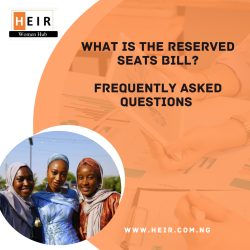Reserved Seats Bill – What are the Benefits?
Despite remarkable achievements by women across many sectors, positions of leadership through politics, for women in NASS, needs to be improved. Overall representation of women in governance has to be increased to position Nigeria as a Nation demonstrating inclusion, creating space for leadership that is unbiased and the full utilisation of resources for our country.





